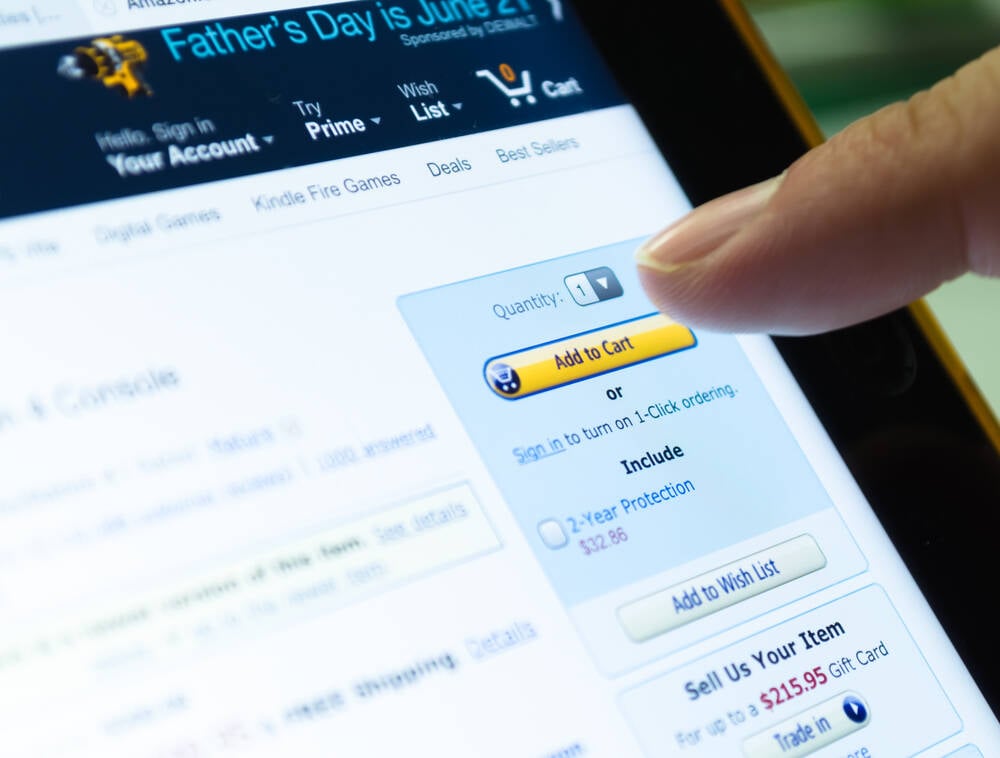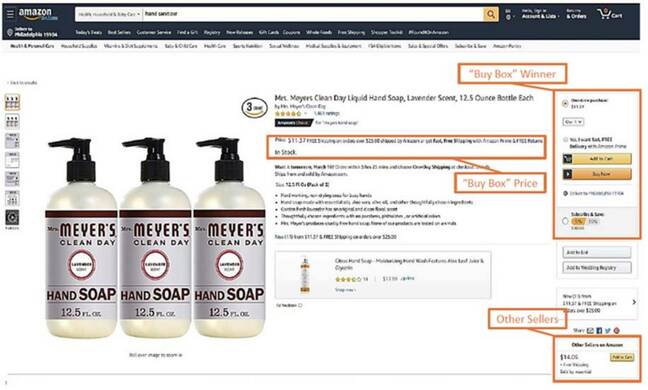Amazon Overcharges Shoppers With Buy Box Algorithm, Fresh Lawsuit Claims

Amazon has been sued by two customers in the United States who claim the internet titan artificially inflates prices, hitting shoppers in the wallet.
Each product listed on the gigantic e-souk usually has a so-called Buy Box on the right-hand side of the page encouraging folks to put items straight into their virtual carts.
The Buy Box discloses the supplier of each item, which is either Amazon itself or a third-party vendor. Crucially, Amazon's algorithms choose who the featured supplier is. There is sometimes a box underneath the Buy Box that lists the same item from other sellers.
A lawsuit filed in a federal district court in Washington argues this approach is misleading for shoppers. Buyers may get the impression that the price and shipping source shown in the Buy Box is the best option available, when in fact a better deal may be had from other suppliers in the box down below, it is claimed.
This labelled screenshot of an Amazon product page, taken from the lawsuit's filings, illustrates that point:

How the Buy Box appears prominently on the right on Amazon product pages, and alternative sellers are listed below in a separate little box
Amazon tends to select itself as the supplier or third-party vendors that pay to be included in the corporation's Fulfillment By Amazon (FBA) program, the lawsuit claims. When cheaper options of the same goods are buried in the alternative sellers box down the page, people end up overlooking that, buying stuff straight from the Buy Box, and paying more – and that's unfair, it's alleged.
Consumers routinely overpay for items that are available at lower prices from other sellers on Amazon
"Consumers reasonably believe that the Buy Box price is the best price available in the marketplace for a given item. But they are often wrong," the court filings, dated Thursday, [PDF] read.
Instead, the Buy Box system "deceptively favors Amazon’s own profits over consumer well-being and will often select an Amazon first party retail or FBA offer over an offer from a non-FBA seller, even when the non-FBA offer for the same product and delivery time is cheaper.
"The result is that consumers routinely overpay for items that are available at lower prices from other sellers on Amazon — not because consumers don't care about price, or because they're making informed purchasing decisions, but because Amazon has chosen to display the offers for which it will earn the highest fees."
For those who don't know: Sellers in the FBA can, among other perks, use Amazon's sprawling warehouse and delivery network to offer free two-day shipping of items to Prime subscribers, making those vendors attractive to shoppers. Life is easier for suppliers in the program, their items appear in Buy Boxes, and Amazon gets its fees.
On the flip side, if sellers don't fork over some of their profits for FBA, their products typically aren't included in Buy Boxes, meaning they'll lose out on sales, the lawsuit argues. The paperwork gives as an example a $55 toy that is sold by an FBA member that is featured in the Buy Box while a non-FBA vendor that offers the same item for $51 is placed in an alternative sellers box lower down.
- Amazon 'punishes' sellers who dare offer lower prices on other marketplaces
- Amazon's practices are 'the essence of competition,' it tells judge
- Amazon on the hook for predictably revolting use of concealed spy cam
- Google, Amazon, Microsoft make the Mozilla naughty list for Christmas shopping
The proposed class-action fight was brought by two California netizens, Jeffrey Taylor and Robert Selway, who claim Amazon broke its home state of Washington's Consumer Protection Act, which prohibits "unfair methods of competition and unfair or deceptive acts or practices in the conduct of any trade or commerce."
They requested a jury trial and damages, and asked other Amazon customers who have made any purchases using the Buy Box from 2016 onward to join the cause.
Over in the UK, consumer-rights activist Julie Hunter took Amazon to a Competition Appeal Tribunal in a £900 million ($1 billion) lawsuit.
A spokesperson representing the mega-biz declined to comment. ®
From Chip War To Cloud War: The Next Frontier In Global Tech Competition
The global chip war, characterized by intense competition among nations and corporations for supremacy in semiconductor ... Read more
The High Stakes Of Tech Regulation: Security Risks And Market Dynamics
The influence of tech giants in the global economy continues to grow, raising crucial questions about how to balance sec... Read more
The Tyranny Of Instagram Interiors: Why It's Time To Break Free From Algorithm-Driven Aesthetics
Instagram has become a dominant force in shaping interior design trends, offering a seemingly endless stream of inspirat... Read more
The Data Crunch In AI: Strategies For Sustainability
Exploring solutions to the imminent exhaustion of internet data for AI training.As the artificial intelligence (AI) indu... Read more
Google Abandons Four-Year Effort To Remove Cookies From Chrome Browser
After four years of dedicated effort, Google has decided to abandon its plan to remove third-party cookies from its Chro... Read more
LinkedIn Embraces AI And Gamification To Drive User Engagement And Revenue
In an effort to tackle slowing revenue growth and enhance user engagement, LinkedIn is turning to artificial intelligenc... Read more

